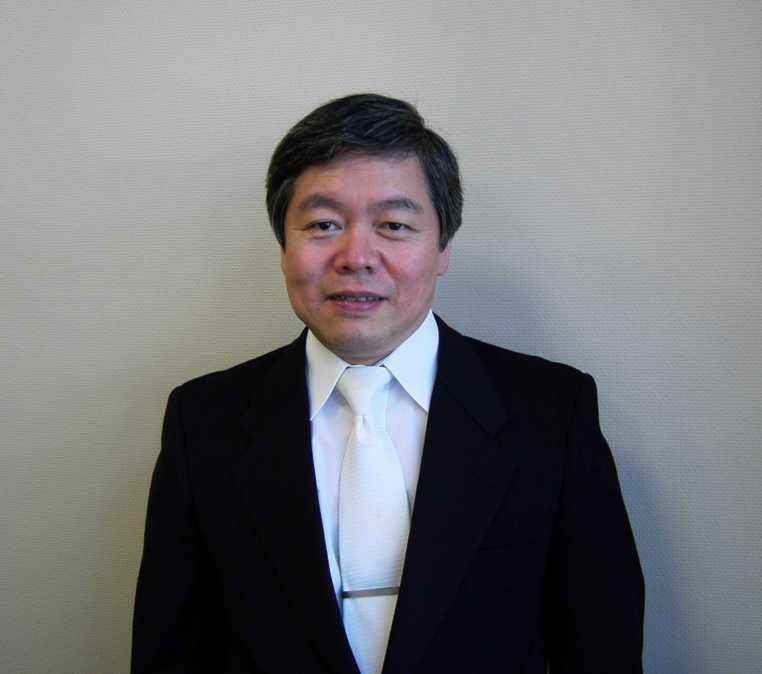
Born in Saitama, Japan. At a time of junior high school, Shigeru Yamazaki was a member in school band, and studied composition and orchestration by himself to arrange various pieces not included in band repertoire for his band. In his final year in this school, his arranging works were performed in the special concert of Saitama prefectural board of education by his conducting.
Shigeru Yamazaki Graduated from the Music Department, Instrumental Section, of Tokyo National University of Fine Arts and Music in 1973, and completed the Master's degree program of the above University in 1977. In this University, he also studied composition and conducting as sub-subject. During this time, he met Japanese leading conductor Kazuo Yamada and had a lucky chance of getting a short lesson with him. It had a big influence on Shigeru Yamazaki.
After graduating, Shigeru Yamazaki was a member as tuba player and arranger in Japan Shinsei Symphony Orchestra. In this orchestra, he met again Kazuo Yamada who was an honorary conductor of it. Then he became a conducting pupil of Kazuo Yamada and appeared as a conductor with this orchestra.
In 1985 Shigeru Yamazaki took part as an active conducting student in the opera course with Hartmut Haenchen at the Kirishima International Music Festival and Courses. At the same time, studied baroque music conducting with him.
In 1986 Shigeru Yamazaki Held a conducting recital with Japan Shinsei Symphony Orchestra to make an official debut as a conductor, and was highly acclaimed.
In 1987 Shigeru Yamazaki Completed the Vienna Master Courses and received the "Conductor with Orchestra" diploma for conducting the Pro Arte Orchestra. Studied with Julius Kalmar. The same year studied with Guennadi Rozhdestvensky at the Accademia Musicale Chigiana.
In 1991 Shigeru Yamazaki took part as a conductor in the International Workshop for Conductors in Zlin, the Czech Republic, conducting the Oromouc Chamber Orchestra and the Bohuslav Martinu Philharmonic. Received extra instruction from J. Belohlavek and M. Machek.
In 1991, after Workshop in the Czech Republic, Shigeru Yamazaki founded the Saitama Chamber Orchestra in his homeland, and has been a conductor and music director. With this orchestra he has made many sort of works - concert, TV, recording, opera, ballet, etc. In 2006 he produced and conducted dialog concert with Swiss conductor Heinrich Knüsel who is a music director of 'Dormant Noten' project in Lucern, Switzerland.
In addition, Shigeru Yamazaki has guest conducted with many orchestras, choruses, opera and ballet such as Japan Shinsei Symphony Orchestra, Gunma Symphony Orchestra, Japan New Sinfonica, Tokyo Chamber Orchestra, Tokyo Sing Academie Orchestra, Yasuo Mito kammerorchester, Ensemble Orchestra Ellora, Kazo Mixed Chorus, Suncity Civic Chorus, Gruppo Musicale (opera) and Fujiwara Ballet School. And he conducted many civic orchestras and bands such as Koshigaya Civic Symphony Orchestra (1985 to 1988, the standing conductor), Chuo Philharmonia Orchestra (1986 to 1992, the standing conductor), Dolce String Orchestra, Koshigaya Civic Band and Noda Civic Band. Besides he has been a permanent conductor both of Musashi University Töne Kammerorchester and Nippon Institute of Technology Wind Ensemble more than twenty years.
In 2007 Shigeru Yamazaki guest conducted armonia Kammerorchester in Luzern, Switzerland and named as the first guest conductor.
And as an arranger, Shigeru Yamazaki has produced various kinds of works for concert and recording - symphonic orchestration, chamber music, strings, instrumental solo or ensemble, vocal solo or ensemble, chorus, songs, film music, band, etc. In 1996 he re-orchestrated L. Minkus's "Don Quixote" for Fujiwara Ballet School getting more light sound. In 2002 he arranged Japanese famous song Kosaku Yamada's "Karatachi no Hana (The Flower of Trifoliate Orange�)" for Japanese three singers appeared in "The Three Tenors Last Concert In Japan". In 2007 Michio Miyagi's Haru no Umi (Spring Sea) performed with armonia Kammerorchester in Luzern.
In 2007 Shigeru Yamazaki was chosen in the book "100 musicians in Saitama" (P-Plan Publication).